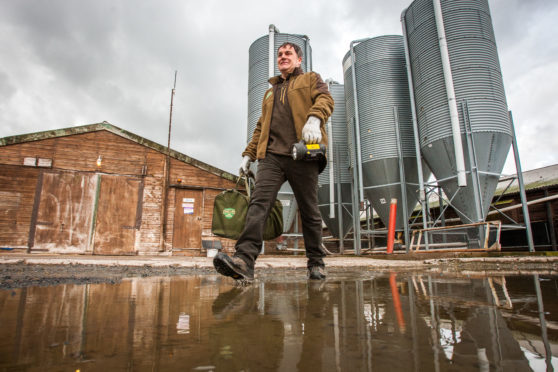Gone are the days when rats were a problem that could be resolved by an enthusiastic terrier, a rifle or a bucket of poison purchased from the hardware shop.
The highest supermarket and farm assurance standards now demand
evidence of year-round control of vermin, and a pest control vehicle parked beside a farm steading is no longer a mark of failure but evidence that farmers are passing responsibility to the professionals.
The latest legislation means practitioners need to be certified in the responsible use of rodenticides and undertake environmental risk assessments to avoid the accidental
poisoning of wildlife, and the paperwork has to be up to date when the farm
assurance inspectors come to call.
The modern approach to vermin control has resulted in more work for professionals like Andy Law, whose pest control business is based on the outskirts of Perth.
He and his partner Vanessa Harley employ a full-time on-the-road team of three and while they do domestic, council and institutional work, contracts to provide year-round control on farms make up a major portion of their work.
The team visits sheep and cattle units, potato and grain producers, chicken farms, stables and smallholdings.
Vanessa said: “Farmers have enough on their hands, so it’s often more
convenient for them to let someone else take care of pest control and do all the paperwork.
“It means all the boxes can be ticked and vermin are kept under control.”
Rats and mice can spread deadly diseases such as leptospirosis and
Weil’s disease and can pose a serious risk to the health of farmers and their families, but there are also strong commercial reasons for keeping them at bay.
“They can chew through cables and bring down farm office computer
systems or chiller systems, they can bring down lighting, they’ll eat the feed, burst open bags, spread disease like abortion in sheep and salmonella in fowl,” said Vanessa.
“They can also contaminate the food you’re selling, and if you get a few mouse droppings in a punnet of strawberries in Marks and Spencer, that’s your whole consignment condemned.”
Poisons are the first line of attack, but shooting, terriers, traps, aluminium phosphide gas and glue boards – which can catch rats and mice alive – are also used under professional supervision.
Rats and mice top the list of unwanted farm visitors, but moles, rabbits, foxes, stoats and deer follow closely, and Andy is often called out to control birds when there is a risk of crop contamination.
The team can eradicate insect pests like grain weevils and in a domestic setting, the problems they tackle can range from bedbugs to carpet moths.
And while contracts to provide pest control are becoming the norm on farms, Vanessa says they regularly get called out to handle emergency situations.
She added: “We got a call asking us to clear an entire steading that was
crawling with rats just 10 days ahead of it being needed to store grain.
“That was one of the biggest
challenges ever.”
nnicolson@thecourier.co.uk










